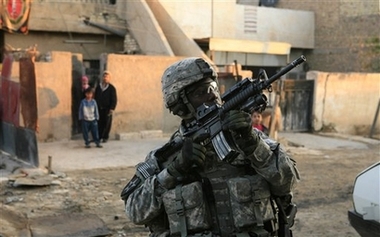GIs sweep Baghdad; al-Qaida leader hurt
(AP)Updated: 2007-02-16 08:39
BAGHDAD, Iraq - US and Iraqi forces pushed deeper Thursday into Sunni militant strongholds in Baghdad - where cars rigged with explosives greeted their advance - while British-led teams in southern Iraq used shipping containers to block suspected weapon smuggling routes from Iran. Early Friday, a spokesman for the Interior Ministry said the leader of al-Qaida in Iraq, Abu Ayyub al-Masri, was wounded and an aide was killed in a clash the previous day with Iraqi forces north of Baghdad.
However, the deputy interior minister said he had no information about such a clash, and two US officials could not immediately confirm the report.
The series of car bomb blasts, which killed at least seven civilians, touched all corners of Baghdad. But it did little to disrupt a security sweep seeking to weaken militia groups' ability to fight US-allied forces - and each other - as Iraq slips further into factional bloodshed.
The attacks, however, pointed to the critical struggle to gain the upper hand on Baghdad's streets. The Pentagon hopes its current campaign of arrests and arms seizures will convince average Iraqis that militiamen are losing ground. Yet each explosion is another reminder of the militants' resources and resolve.
Most of the latest resistance has come from Sunni factions, which perceive their Saddam Hussein-era influence slipping away as the majority Shiites extend their political muscle and bolster ties to powerful Iran.
In Baghdad's Dora neighborhood - a longtime Sunni militant hotbed - two parked cars wired with explosives were triggered as a joint US-Iraqi patrol rolled past. The convoy was unharmed, but the blast killed at least four civilians and wounded 15.
Control of the Dora district, a once upscale neighborhood favored by Saddam's regime, is important as a gateway between Baghdad and the Shiite-dominated south. Two other car bomb blasts came as security forces moved through the capital, killing at least three civilians.
Outside Baghdad, troops also faced Sunni ambushes. In Buhriz, about 30 miles northeast of the capital, Sunni gunmen and soldiers from the 1st Squadron, 12th Cavalry Regiment engaged in a 20-minute firefight.
US Bradley fighting vehicles fired 25mm rounds into homes shielding the gunmen, said an Associated Press reporter traveling with the unit.
No US casualties were reported, and the militant toll was not known. Separately, however, a US Marine was killed in combat in Iraq's western Anbar province, a Sunni militant stronghold.
The announcement about the wounding of al-Masri, the al-Qaida in Iraq leader, came from Brig. Gen. Abdul-Karim Khalaf, an Interior Ministry spokesman. He said the clash occurred near Balad, a major US base about 50 miles north of the capital, and identified the dead aide as Abu Abdullah al-Majemaai.
Al-Masri took over the leadership of al-Qaida in Iraq after its charismatic leader, Abu Musab al-Zarqawi, was killed in a US airstrike last June in Diyala province northeast of Baghdad. In October, false reports surfaced that al-Masri was killed in a raid, and the US military performed DNA tests on a slain militant to see if he was the al-Qaida leader.
Al-Zarqawi was widely believed to have fomented sectarian war through his campaign of brutal suicide attacks against Shiite civilians. The first steps of the security operation display the sectarian divides complicating any plan to calm Baghdad - which is key to begin stabilizing the rest of the country.
A leader of the main Sunni bloc in parliament, Adnan al-Dulaimi, claimed the US-led sweeps have "started to attack" mostly Sunni areas. "It should concentrate on those who are perpetrating the violence and terrorist acts in all districts," he said - an apparent reference to the Shiite militia stronghold of Sadr City.
Around the capital, US and Iraqi soldiers set up dozens of roadway
checkpoints and conducted top-to-bottom searches of vehicles and motorbikes.
Waiting in a snarl of traffic at one blockade, Mohammed al-Jubouri said people
are willing to put up with delays so long as the security sweep shows some
results after bombings that have killed hundreds of civilians this year.
| 1 | 2 |  |
|
||
|
||
|
|

